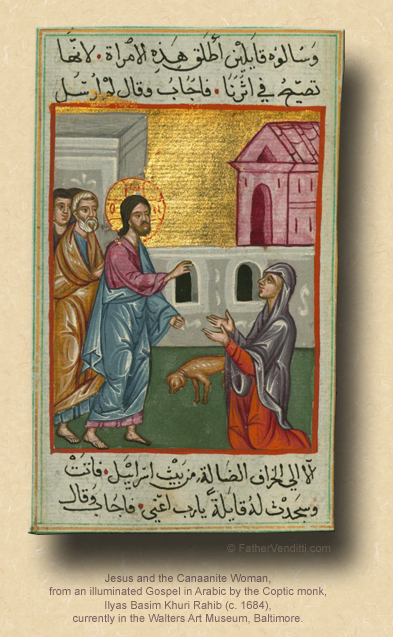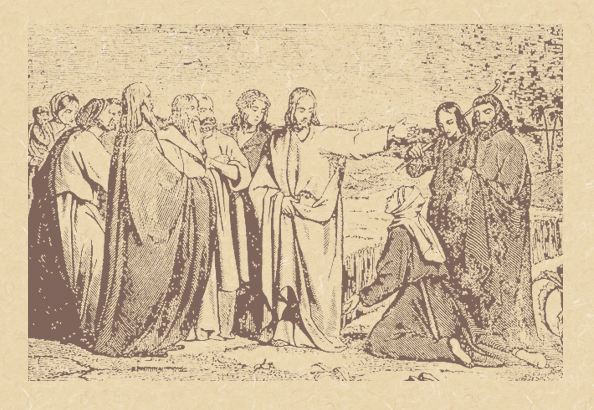What Have I Done Wrong?
The Eighteenth Wednesday of Ordinary Time; the Memorial of Sixtus II, Pope, & Companions, Martyrs; or, the Memorial of Saint Cajetan, Priest.*
Lessons from the primary feria, according to the ordinary form of the Roman Rite:
• Numbers 13: 1-2, 25--14: 1, 26-29, 34-34.
• Psalm 106: 6-7, 13-14, 21-23.
• Matthew 15: 21-28.
|
If a Mass for St. Sixtus and his deacons is taken, lessons from the feria as above, or from the proper:
• Wisdom 3: 1-9.
• Psalm 126: 1-6.
• Matthew 10: 28-33.
…or, any lessons from the common of Martyrs for Several Martyrs.
|
|
If a Mass for St. Cajetan is taken, lessons from the feria as above, or from the proper:
• Sirach 2: 7-11.
• Psalm 112: 1-9.
• Luke 12: 32-34.
…or, any lessons from the common of Pastors for One Pastor, or the common of Holy Men & Women for Religious.
|
The Third Class Feast of Saint Cajetan, Confessor; and, the Commemoration of Saint Donatus, Bishop & Martyr.**
First lesson and gradual psalm from the common "Os justi…" of a Confessor not a Bishop, third lesson from the proper, according to the extraordinary form of the Roman Rite:
• Ecclesiasticus 31: 8-11.
• Psalm 91: 13-14, 3.
• Matthew 6: 24-33.
|
If a Mass for the commemoration is taken, lessons from the proper:
• James 1: 2-12.
• Psalm 36: 30-31.
• Mark 13: 33-37.
|
FatherVenditti.com
|
8:26 AM 8/7/2019 — Today’s Gospel lesson is another of those which bludgeons us with an inconvenient truth; for, in it, our Blessed Lord is approached by a woman who is drawn to Him solely by faith, seeking nothing for herself, but begging Him to help her tormented daughter. He ignores her, so the Gospel tell us; but, she's so persistent in her pursuit of our Lord that the disciples ask Him to “Rid us of her…, she is following us with her cries” (Matt. 15: 23 Knox). He turns to her and says, “My errand is only to the lost sheep that are of the house of Israel” (v. 24 Knox). In other words, “I'm not going to help you; you're not even a Jew.” And I'm sure you're waiting with baited breath for me to explain to you how our Lord isn't really saying what He seems to be saying, and how this is all the result of some inferior translation.
But there's nothing wrong with this translation. He appears to be rude to this poor woman because He is. He seems to be telling her that, because she's not of the same nationality as He, He's not interested in her problem because that, in fact, is what He's telling her.  There is no mistake. He even goes so far as to get personally abusive, telling her, “It is not right to take the children’s bread and throw it to the dogs” (v. 26 Knox); and, if you're a woman who's ever been called a dog by a man, I can only guess what that must feel like. There is no mistake. He even goes so far as to get personally abusive, telling her, “It is not right to take the children’s bread and throw it to the dogs” (v. 26 Knox); and, if you're a woman who's ever been called a dog by a man, I can only guess what that must feel like.
Of course, there is a method in our Lord's madness which has deep implications for our interior life, and we'll get to that in a moment; but, consider first how this poor woman reacts to this very brazen insult: "Yes, Lord, yet even the dogs eat the crumbs that fall from their masters' table" (v. 27 RSV). I wonder how many of us would be able to just swallow an insult like that; but, remember, this woman is desperate. Saint Anselm tells us, in one of his homilies (cf. Golden Chain, MT-MK 4521), that it's clear from the text that this woman clearly believed that Jesus was God, something that most of the Jews with our Lord that day probably didn't yet realize. Keep in mind, too, that she's a Canaanite. The Canaanite's were a race of people who had been Jews, but had abandoned the faith and fallen into apostasy, so the Jews threw them out of Israel so as not to be corrupted by them. She's sneaked back across the border for the sole purpose of asking our Lord to help her tormented daughter; she doesn't even want anything for herself. And unless you’ve lived most of your life under a rock, you’ll know from experience that desperation has a way of tearing down the walls of pride. She's come there with a mission, and she's not about to let anything derail her from it, even if it means she has to swallow her pride and take an insult without responding to it.
And here is where we are able to deduce the method in our Lord's madness. He's not so much testing her;—as Saint Anselm told us, she already believes He's God, and He knows this, so He doesn't need to test her faith—but, she does need to be instructed as to why she's doing what she's doing. She's gone there because—as we've said three times now—she's desperate. Her daughter is suffering, she knows that Jesus is in a particular place at a particular time, so she's off. She's not even thinking clearly. By treating her the way He does initially, our Lord forces her to put the breaks on and think about what she's doing, not because there's anything wrong with what she's doing, but because he wants her to understand her own actions: Tunc respondens Jesus, ait illi: O mulier, magna est fides tua: fiat tibi sicut vis. “And at that Jesus answered her, ‘Woman, for this great faith of thine, let thy will be granted’” (v. 28 Knox). She had no idea that she was acting out of faith, but now she does, and so do the disciples who had initially begged Him to send her away; so, what we have in this episode in the life of our Blessed Lord is just another example of what’s been presented to us on and off all summer: a lesson about the permissive will of God, and how God will often allow a cross or hardship to come our way as a means of enacting a change in us.
There is not a person here who hasn't suffered a tragedy or endured a hardship or borne a cross that hasn't caused us to wonder what on earth God is up to. Like the Canaanite woman, we are already people of faith, and so we ask, “Why is this happening? What have I done wrong?” The answer is that we've done nothing wrong; but, if God were to reveal to us the reason for our suffering, or show us his plan for us, then there would be no merit in the sacrifice. As we already observed in celebrating the memorials of many of the saints presented to us this time of year, when one sets out to serve the Lord, one doesn't do what one wants; one does what one is told. Saint Paul said it better:
O the depth of the riches of the wisdom and of the knowledge of God! How incomprehensible are his judgments, and how unsearchable his ways! For who hath known the mind of the Lord? Or who hath been his counsellor? (Rom. 11: 33-34 DRA).

* Pope St. Sixtus (d. 258) suffered persecution under Emperor Valerian. While offering Holy Mass, he was taken personer and put to death together with four of his deacons. His name is included in the Roman Canon.
Cajetan (1480-1547) was known for his spirit of prayer and charity. Because of his zeal for souls, he is sometimes called the "hunter for souls." He founded the Congregation of Clerks Regular (known today as the "Theatines") and was a great Catholic reformer.
** Donatus was Bishop of Arezzo in Tuscany, and was beheaded under the Emperor Julian the Apostate in AD 361.
|

